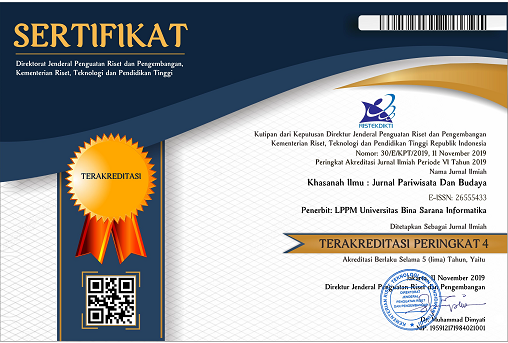Perencanaan Pengembangan Destinasi Wisata Menggunakan Analisis MSP+DM
Sari
Keywords: Community Based Tourism, Marketing, Sustainability, Participatory, Disaster Mitigation, MSP + DM
Abstrak - Penelitian ini dilakukan untuk merancang sebuah analisis untuk pengembangan kawasan wisata berbasis masyarakat. Kondisi awal sebuah kawasan perlu ditetapkan secara terukur agar pengembangan dan starteginya dapat ditetapkan dan lebih mudah dievaluasi. Variabel yang digunakan adalah unsur-unsur dalam sebuah aktifitas bisnis kepariwisataan yaitu: Kepemasaran/Marketibility, Keberlanjutan/Sustainibility, Parisipatif/Participatory, dan Mitigasi Bencana/Disaster Mitigation (MSP+DM). Pengkonversian beberapa variabel tersebut secara kuantitatif menjadi skala nilai untuk mengukur atraksi dan potensi wisata yang ada di kawasan pengembangan.
Kata Kunci : Pariwisata Berbasis Masyarakat, Kepemasaran, Keberlanjutan, Partisipatif, Mitigasi Bencana, MSP+DM
Teks Lengkap:
PDFReferensi
Arismayanti, N. K. (2010). Perencanaan dan Pengembangan Kawasan Pariwisata Di Bali. Jurnal Kepariwisataan Indonesia, 5(2), 195.
ASEAN. (2015). ( ASEAN Tourism ). Retrieved April 20, 2017, from http://www.aseantourism.travel/blog/detail/community-based-tourism-in-asean-region
Gao, C. Y., & Peng, D. H. (2011). Consolidating SWOT analysis with nonhomogeneous uncertain preference information. Knowledge-Based Systems, 24(6), 796–808. http://doi.org/10.1016/j.knosys.2011.03.001
Garcia Lucchetti, V., & Font, X. (2013). Community based tourism: critical success factors. ICRT Occasional Paper, (27), 1–21. Retrieved from http://www.icrtourism.org/wp-content/uploads/2012/03/OP27.pdf
Goranczewski, B., & Puciato, D. (2010). SWOT Analysis in the Formulation of Tourism Development Strategies for Destinations. Tourism, 20(2). http://doi.org/10.2478/v10106-010-0008-7
Huwae, K. C. (2008). Strategi Pemasaran Destinasi Pariwisata Pulau Ambon oleh Pelaku Bisnis Lokal. Gadjah Mada.
Kotler, P., & Amstrong, G. (2008). Prinsip-Prinsip Pemasaran Jilid 1 (Principles of Marketing). (B. Sabran, Ed.) (12th ed.). Jakarta: Erlangga.
Miller, H. E., Engemann, K. J., Yage, R. R., & Yager, R. R. (2006). Communications of the IIMA Disaster Planning and Management Disaster Planning and Management. Communications of the IIMA, 6(2). Retrieved from http://scholarworks.lib.csusb.edu/cgi/viewcontent.cgi?article=1308&context=ciima
Oreski, D. (2012). Strategy development by using SWOT -AHP. TEM Journal, 1(4).
Priatmoko, S. (2018). Analysis of Marketability, Sustainability, Participatory and Disaster Mitigation (MSP+DM) for the development of rural Community-Based Tourism (CBT) destinations Case study: Depok beach, Bantul, Yogyakarta. IOP Conference Series: Earth and Environmental Science, 202(1). http://doi.org/10.1088/1755-1315/202/1/012032
Priatmoko, S. (2018). Working Rural Eco Tourism Planning in Yogyakarta Using MSP + DM Analysis. E-Journal of Tourism, 5(1), 22–29. http://doi.org/https://doi.org/10.24922/eot.v5i1.38457
Purbadi, D. (2016). PENGEMBANGAN PROGRAM PEMBERDAYAAN MASYARAKAT BERKELANJUTAN STUDI KASUS : KAWASAN WISATA PANTAI BARU ,. In Seminar Nasional hasil Pengabdian masyarakat (SENDIMAS). Yogyakarta.
Rangkuti, F. (2006). Analisis SWOT: Teknik Membedah Kasus Bisnis (14th ed.). Jakarta: Gramedia Pustaka Utama.
Republik, I. UU 24 Tahun 2007 Tentang Penanggulangan Bencana (Disaster Management), Pub. L. No. UU 24 (2007). Indonesia.
UNEP. (2011). Towards a Green Economy: Pathways to Sustainable Development and Poverty Eradication. Sustainable Development. http://doi.org/10.1063/1.3159605
UNISDR. (2009). Risk. 2009 UNISDR Terminology on Disaster Risk Reduction. Geneva: UNISDR.
UNWTO. (2011). UNWTO Annual Report A year of recovery.
Zapata, M. J., Hall, C. M., Lindo, P., & Vanderschaeghe, M. (2011). Can community-based tourism contribute to development and poverty alleviation? Lessons from Nicaragua. Current Issues in Tourism, 14(8), 725–749. http://doi.org/10.1080/13683500.2011.559200
DOI: https://doi.org/10.31294/khi.v10i1.5624










